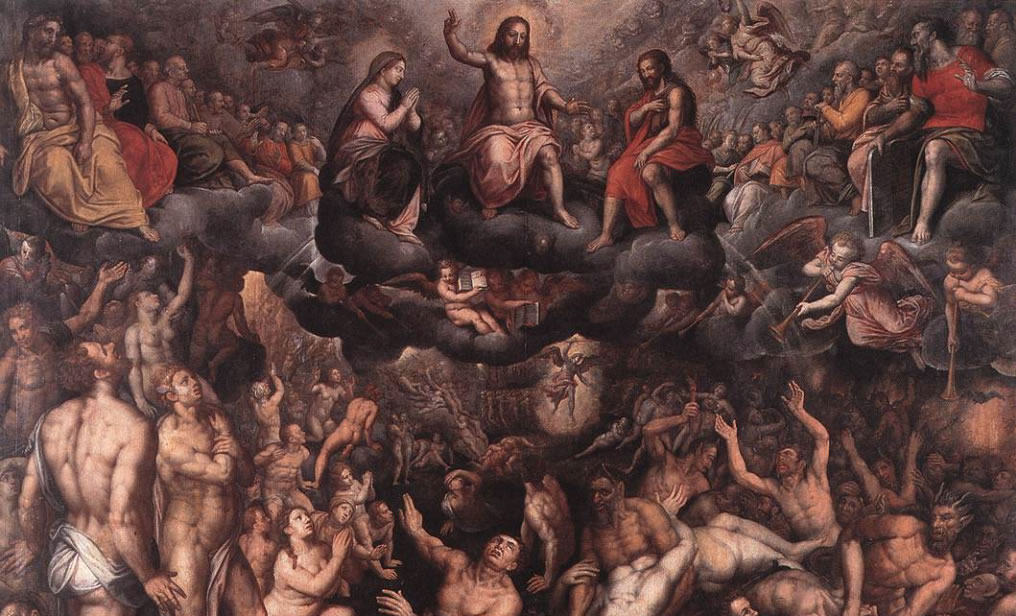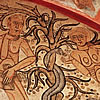Emptying Purgatory
We have the chance to empty purgatory by applying indulgences to the dead. How can we do that? We do it by meriting indulgences and applying it to them. Here is how that works.
Why is there a purgatory?
Temporal punishment is a consequence of sin to atone for a wrong. We shouldn’t see this as an act of a vengeful God who is angry because we disobeyed him. Instead, we should see God as a loving Father who sets us straight. Say a child browsed a website he wasn’t supposed to and his father found out. His father can do nothing, but that mean he is indifferent and doesn’t care about the child growing with virtues. The other thing the father can do is set the child straight by prohibiting the use of the internet for a week. By providing a “punishment” the child gets to reflect on the wrong he has done with the possibility of realizing the need to adjust his life.
Another way to see this is through justice. Say someone stole $100 from you. She acknowledges the act, feels guilty and asks forgiveness from you. Even if you forgive her, she still owes you $100; she still has the obligation to make restitution if there is to be justice and to properly amend the broken relationship.
So every time we sin is an offense to God and so we have to make an act of atonement through temporal punishment. Sometimes, however, we die before we are able to make restitution for all our sins. Even if we die in the friendship of God, we still have to pay for these debts we’ve incurred. We do this in purgatory. So we can see purgatory as a stopover station for those who are already assured of heaven. It is place to“settle" debts owed to our personal sins.
How do indulgences help those in purgatory?
The Catechism defines an indulgence as the remission of temporal punishment due to sins that are already forgiven (through the sacrament of Reconciliation) which can be applied to oneself or to the dead. (CCC 1471)
We earn it by doing prescribed works outlined by the Church, which are described in the next section. While we can apply it to ourselves, we can also apply it to those in purgatory. We don’t apply it to those in heaven because they no longer need it, and we don’t apply it to those in hell because they have already decided their eternal separation from God.
We can apply it to those in purgatory because the Church is one even if it composed of three “organs”: the Church Triumphant in heaven, the Church Militant on earth, and the Church Suffering in purgatory. Since the Church is the one mystical body of Christ, we are all interconnected. We call this concept the Communion of Saints. So just as the organs of on one body help each other out, so do the different “organs” of the body of Christ help each other. Those in heaven can pray for us on earth and purgatory. Those in earth can seek help from those in heaven, and pray for those in purgatory. Those in purgatory can pray for those on earth. Therefore, whatever indulgence we merit can be applied to those in purgatory for they no longer can merit. We cannot apply it to the living for they can merit for themselves. (Of course there are exceptions for those who have some disability.)
How do we merit indulgences?
There are four works we can perform to gain a plenary indulgence. This means all temporal punishments are waived (as compared to a partial indulgence, which applies only to some temporal punishments.)
As prescribed by the Manual of Indulgences, do the following to merit a plenary indulgence daily during Lent:
- Confess sins in the Sacrament of Reconciliation, with the interior disposition to detach yourself from all sin. The confession can be done 20 days before or after the prescribed work. The confession can be used for several indulgences.
- Receive Holy Communion
- Pray the intentions of the Pope (one Our Father, one Hail Mary are the minimum)
- Perform ANY ONE of the following prescribed works while in a state of grace, within several days before or after the required actions above:
- Pray the Stations of the Cross in a place where there are 14 Stations of the Cross. You must move from one station to another. If you are in a large group, only the leader needs to move from one station to another. Those who cannot move because of some disability, can instead read and meditate on the Passion and Death of Christ for at least 15 minutes.
OR - Devoutly recite five decades of the Rosary in a church, oratory, in a family. It can also be said as a group in a general area used for gathering “for some honest purpose.” The decades have to be said without interruption (not broken into different parts of the day.)
OR - Visit the Eucharist in adoration for 30 minutes.
OR - Read Scripture from a “competent authority” (better use a Catholic Bible with an Imprimatur) for 30 minutes. If you cannot read, you can listen to someone read.
- Pray the Stations of the Cross in a place where there are 14 Stations of the Cross. You must move from one station to another. If you are in a large group, only the leader needs to move from one station to another. Those who cannot move because of some disability, can instead read and meditate on the Passion and Death of Christ for at least 15 minutes.
The confession can be done once for several plenary indulgences, but the Holy Communion, Prayer for the Pope, and a prescribed work must be done to merit each plenary indulgence. You can merit only one plenary indulgence a day.
How do I apply it to the dead?
God knows what’s in each of our hearts, so simply do the prescribed works with the intention of applying it to someone. If you prefer, you can say, “Lord I am doing this for [name].” Start with the deceased in your family: parents, siblings, grandparents, uncles, and aunts, etc. Apply it to “the soul in purgatory who needs it most.” Or put the plenary indulgence you merited into the hands of Our Lady and let her choose.
How wonderful it would be if we could all do this and empty out purgatory.

A Sky Full of Stars
Know Our Lady through her Titles in the Litany
The Church helps us understand who Mary is by honoring her with different titles in the Litany of the Blessed Virgin Mary. Unfortunately, over time and difference of culture, we might not grasp what it is the Church is ascribing to her and lose that opportinity to get to know her.
In A Sky Full of Stars, each title of the Litany is explained so we get know Mary more and fall in love with her all over again.
Get your copy now either in Hardbound, Paperback, or Kindle
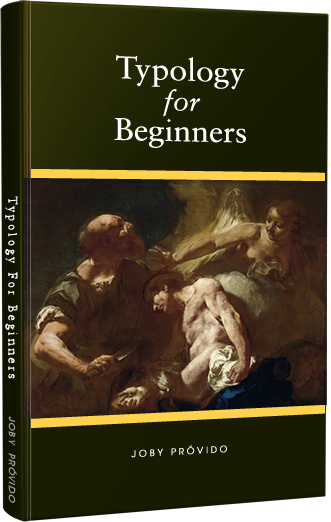
Typology for Beginners
A Catholic Perspective on understanding the New Testament through the Old Testament
First-century Jews converted to Christianity in droves because of the way the New Testament was written to show Jesus was the Messiah promised by the Old Testament. We also learn about how Mary is the New Eve and the Ark of the Covenant in the way the writers portray her.
Through typology, the patterns that connect the Old and New Testaments make the Bible stories more accessible so that one becomes excited to read Sacred Scripture again.
Get your copy now either in Hardbound, Paperback, or Kindle
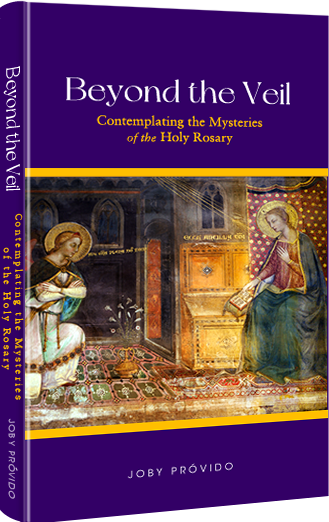
Beyond the Veil
Contemplating the Mysteries of the Holy Rosary
Prayer giants like Pope St. John Paul II, Pope Paul VI, Bl. Archbishop Fulton Sheen, and Bishop Robert Baron advocate that we contemplate on the mysteries of the rosary while we say the vocal prayers. Unfortunately, there are not many books that teach us how to do this. Beyond the Veil comes to the rescue by suggesting seven ways we can pray the rosary the way it was intended.
The larger part of the book offers mental images for each of the mysteries we can use in our contemplation, for how can we imagine the scenes in the rosary if we don't know about them?
Get your copy now either in Hardbound, Paperback, or Kindle
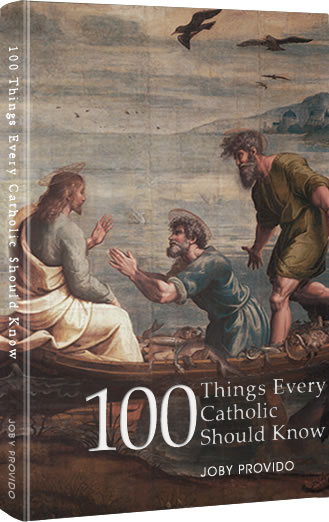
100 Things Every Catholic Should Know
Whether or not you are new to the Catholic Church, or struggling, or lapsed, or dynamically involved, this book will enlighten you with the essentials of the Faith that have been handed down to us by the apostles.
Each of the 100 topics is easy to read and distilled into bite-sized portions. Through cross-referencing, the book also shows how the topics are interrelated. Those who are new to the Faith will find this book an edifying handy reference, and those who have simply forgotten will find it a great review material that might spark a new love for God and religion.
Get your copy now either in Hardbound, Paperback, or Kindle


